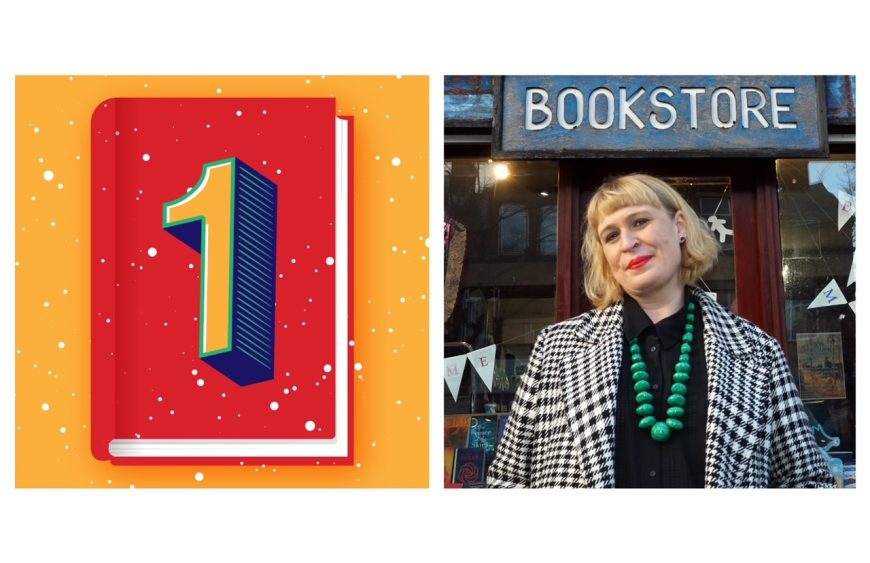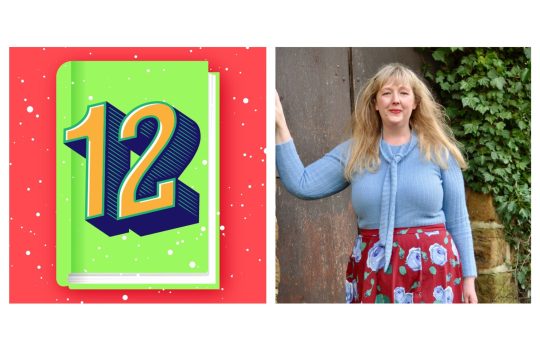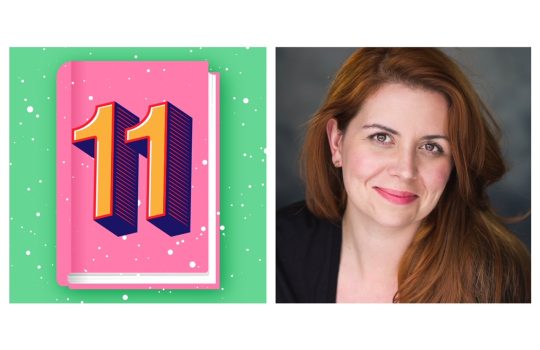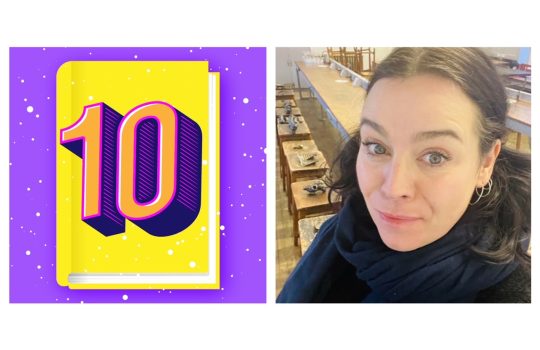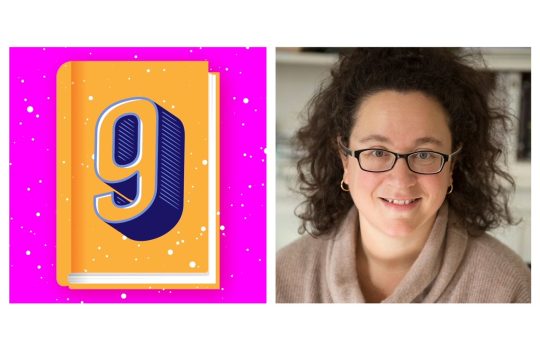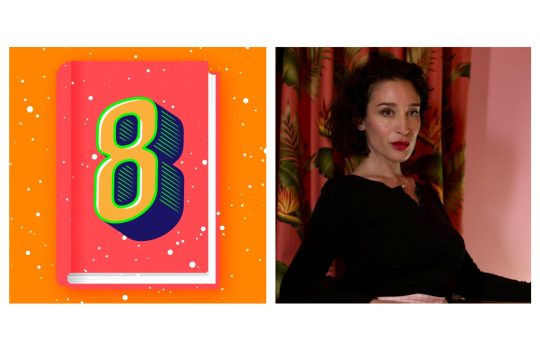Seasons Greetings! And welcome to my Twelve Days of Christmas Writing Advice, brought to you with the aid of a dozen brilliant authors, and to kick us off, a real treat.

Jan Carson is just so lovely, and has been super supportive of my work
“Lockdown changed me as a writer. For fifteen years I’d kept to a similar writing routine. I’d get up in the morning, walk to a coffee shop and spend the following two hours sipping my Americano as I ploughed on with my latest short story or novel. My imagination abhorred a vacuum. I’ve lived by myself for quite some time and learnt, early on, that the silence in my tiny house was not conducive to creativity. I like to sit in crowded spaces and listen into the conversations taking place around me. I’ll hone in on the particular cadences and colloquialisms of the community I’m writing about — most of my work is written in the vernacular of Northern Ireland. I like to watch how people carry themselves when moving across spaces, how their faces fold in laughter or consternation. I feel painterly when I’m doing this; describing and recording humanity straight from the source. I’m still a coffee shop writer.

“After Lockdown eased I quickly returned to my old routines, stubbornly sitting in the same seat in my local café, looking furious as I thump away at the keyboard. I’m not a writer who sits easily with solitude. However, I am grateful for the space which Lockdown afforded me and the way it upset my routines. Yes, Lockdown was lonely. And really frustrating. And there were several days when I seriously wondered if it would ever end. But for the first time since my debut novel was published seven years ago, I had a decent amount of time to pause and rest and have a good think about the whys and hows of writing. I realised, a few weeks into Lockdown that I’d been storming ahead for so long, I’d not stopped to ask myself if I was enjoying the writing experience, what I needed to improve upon, how and what I wanted to learn. On the most basic level, I’d been calling myself a magical realist for fifteen years without really understanding what this meant. I’d never seriously considered what my writing practice meant to me or how it resonated with the specific community I wrote about and into. I wouldn’t want to repeat the last two years but I’m glad to have had this thinking space.
“I read a lot. I made significant in-roads into the towering TBR pile which had overwhelmed my coffee table. (I’m afraid to say, as soon as the bookshops reopened, I let it pile right up again). I read new books. Familiar books. Comforting books, like Daphne du Maurier and Agatha Christie. I managed all 66 of Christie’s crime fiction novels in a year and found them immensely reassuring: the reading equivalent of a big mug of tea. I read books I’d always been meaning to get around to like The Buddha of Suburbia and James Baldwin’s essays, which were both incredible, earth-shattering, immersive experiences and Walden, which was not. Perhaps most significantly, I read a tonne of writer biographies and books about writing and, in doing so, found the words and the justification for writerly things I was already doing instinctively. There’s something quite solitary about being a writer. The best part of my practice is practiced alone in a small room or inside my head. In this isolated state it’s easy to get insecure. I often fall victim to comparison. Why can’t I write like writer x or writer y? Why can’t I master concision or the future tense? Why do three out of five short stories turn out crap? Do I even know how to write? It’s a dark rabbit hole to fall down and scrolling through Twitter, noting the latest list of prize winners and accolades, only ever seems to make my insecurity worse.
“For some reason reading about writing and writers actually helped salve my insecurity. I’d highly recommend picking a few books and diving in. I discovered, early on, that Zadie Smith writes in the same weird way I do. While she has a more literate description for the process I call “writing in waves,” it seems to be working out quite well for her and stumbling upon this information was like a gentle prod in the right direction. “Keep going Jan. You’re doing alright.” I spent two weeks, notebook permanently to hand, in the gentle company of George Saunders and realised — as I always do with Saunders — that I’d learnt so much about the short story form without even realising I was learning. The conversation was just so interesting and witty, I hadn’t noticed myself mentally honing down the flabby bits of my own short stories. I left that book a better editor and, perhaps, a better human being. There’s a kindness which seems to emanate off George Saunders. It sticks to you when you read his work. I read books on magical realism and what it means to be a woman writing about strange, unsettling times and books about the older Northern Irish writers whose shoulders I find myself standing on. None of these books have made me a different writer. I’m still writing the same Northern Irish based, socio-politically engaged magical realist fiction but I feel much more confident explaining this. It’s as if the drive was always inherent, but I’ve now found a language and history to convey who I am.
“I ‘ve also filled reams and reams of notebooks (my Lockdown addiction was buying nice stationery online, an expensive habit, though easier to break than hard drugs), with tips and thoughts about writing practice. While I’m never going to be the kind of writer who follows a set of instructions on how to write a story, it was incredibly helpful to get my brain in gear, thinking seriously about how I structure a sentence, how tension develops and why I’m always tripping over my tenses. If you’re looking for a good place to start with reading about writing, can I recommend an amazing short book by the American writer Verlyn Klinkenborg? Several Short Sentences About Writing is now my go-to book for reassurance when it comes to writing on a sentence by sentence level. It also remains the only book about writing practice which has ever made me laugh out loud. I now press a copy upon every writer I’m mentoring whether they want it or not.
“I loathe the idea that a writer can be taught the so-called “rules of writing,” or that following such rules will lead to anything approximating a story you’d actually want to read. Mostly writing feels like trying to bake a cake sans recipe or correct ingredients with nothing to follow but a kind of vision, you saw once, fleetingly, in a dream. It’s amazing to me that great stories continue to be written every day when no writer really knows what they’re doing, least of all me. Saying, all this, let me briefly contradict myself. I like to tell my students that it’s no bad thing to learn a few rules before you set off on your writing journey, so long as you don’t get obsessed with them. “When I first learned to drive,” I always tell them, “I had to look down at my feet on the pedals every time I changed gears. I’ve been driving for 24 years now, and I no longer have to check my feet. They just move the pedals instinctively.” Driving… Writing… Please excuse the slightly tired analogy.
“From the writers’ biographies (Shirley Jackson, Toni Morrison, Agatha Christie, Carson McCullers, Elizabeth James Howard and many more), I discerned one frequently recurring theme. A very small proportion of writing takes place at the laptop/typewriter/notebook. As someone who can only manage around two hours a day concentrating at my keyboard, I’ve long suspected that most of my stories are written elsewhere. I walk with my characters — during Lockdown, round and round the same duck pond — talking to them until they feel real. I fall asleep each night with plot points and questions just waiting to merge with my dreams. I fill my brain up with story fodder: conversations with interesting folk, films, art, experiences — both profound and mundane — and yes, obviously, lots of books.
“It came as no surprise, though it was reassuring, to be reminded once again that writers are people who actually live. They are engaged with the issues of their age. They love. They suffer. They consume in excess. They talk a lot or sometimes choose to be silent and mysterious. And in each of these lively pursuits, they are writing continuously. This was far and away, the biggest revelation of my Lockdown reading, the realisation that as a writer, there is no boundary between the “ordinary” and the writing life. My father passed away in August of this year and as I sat holding his hand in the ICU, (and I note, with immense gratitude, how fortunate I was to have been allowed this most basic privilege of humanity), I was both very present and also, elsewhere in, my head, thinking of how I might write about this moment later, how I could make of it something real and meaningful. I make no apologies for saying this. I am a writer. I am always writing. I have no ability to switch this — the most essential part of myself — off and on at a whim. I believe my father understood this. He wouldn’t have wanted it any other way.
“I don’t have a degree in creative writing. I’m not against degrees or courses, they’re just not for me. Instead of acquiring a qualification, I have chosen to read excessively and glean all I can from other people’s books. My advice to any emerging fiction writer is to read as much as you can. Read widely. Read deeply. Read across the eras, genres and cultures. Read books which are not the sort of books you normally read. Read fiction obviously, but don’t forget there are things to learn from other writers who’ve graciously committed their writing secrets to the page. I can guarantee you’ll find the experience endlessly reassuring because the main thing reading about writing will teach you is that there’s no one way to write a story and no set template for being a writer. No writer is charged with anything save the responsibility to tell the story only they can tell. And every single one of us appears to be making it up as we go along. What a tremendously comforting thought.”
• Jan Carson is a writer and community arts facilitator based in Belfast, Northern Ireland. She has a novel, Malcolm Orange Disappears and short story collection, Children’s Children, (Liberties Press), two micro-fiction collections, Postcard Stories 1 and 2 (Emma Press) and a short story collection, The Last Resort (Doubleday). Her novel The Fire Starters(Doubleday) won the EU Prize for Literature for Ireland 2019, the Kitschies Prize for Speculative Fiction 2020 and was shortlisted for the Dalkey Book Prize 2020. Her third novel, The Raptures will be published in paperback in January 2023 and you can pre-order it here.


